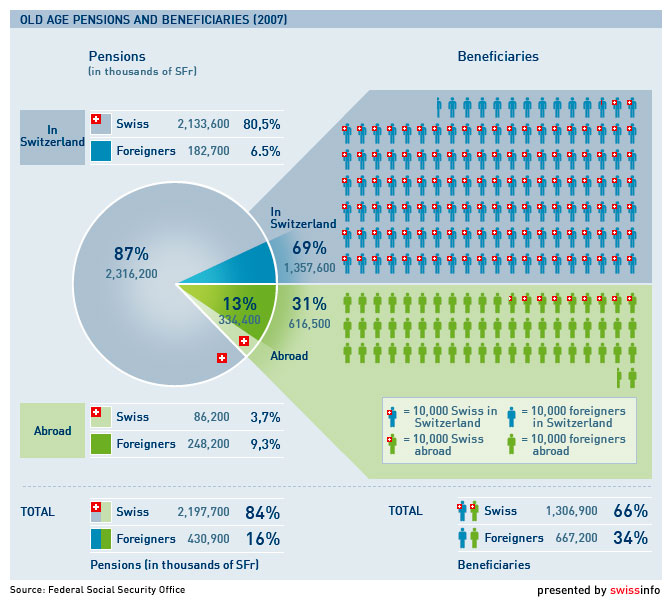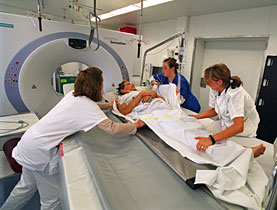Welfare abuse dismissed ahead of EU vote

Opponents of extending a labour accord with the European Union warn of a flood of foreigners who would burden Switzerland's strained social security system.
Ahead of a nationwide vote on Sunday the government rejects such allegations, saying the old age and disability pension systems, as well as the unemployment insurance schemes benefit from payments by foreigners.
The Swiss People’s Party and other rightwing parties have campaigned with posters showing black ravens maliciously pecking at Switzerland implying foreigners are a threat for the country and its welfare system.
They claim that anybody who has worked in Switzerland is eligible for an old age pension.
The argument has had considerable pulling power in the campaign as a recent opinion poll found.
“Concerns for the social security system among opponents of the labour accord play a key role,” says Claude Longchamp of the gfs.berne research and polling institute.
However, the supporters of the labour treaty, including the government and most political parities, have dismissed such reasoning as scare mongering and populist.
The president of the centre-right Christian Democrats, Christophe Darbellay denounced the no camp for “running a phoney campaign”.
Conditions
The Federal Social Security Office confirms that everybody who has contributed to the state-run retirement fund is entitled to a pension at the end of his working life, but there are additional conditions.
“Only those who pay into the system for 44 years will get the full pension. Many foreigners only qualify for a symbolic amount,” says the office’s Stephan Cueni.
“We are not a self-service organisation where you can help yourself to whatever you like,” he adds.
Contributions over just 12 months will result in a monthly pension worth SFr52 ($46), but the money will not be paid out before the beneficiary reaches retirement age – currently 65 for men and 64 for women.
A report by the State Secretariat for Economic Affairs (Seco) found that the open Swiss labour market attracted mainly young, high-skilled labour from the EU after the labour accord came into force in 2002.
Boon, not burden
Those who earn more than SFr80,000 a year on average pay more towards old age and disability pensions than is being paid out to foreigners in the same period.
“It was a pleasant surprise to learn that the free movement is a boon for us. Foreign labour cannot be said to be a burden on the pension scheme,” says Cueni.
He adds that Switzerland has had individual accords on social security with most EU member states for years.
Rejection of the labour accord would not lead to a significant drop in payments to foreigners because the previous regulations would be re-introduced, according to Cueni.
As far as disability benefits are concerned, Cueni stresses that recipients must have lived in Switzerland and paid regular contributions for at least three years.
“But after the minimum period monthly benefits are infinitesimally small,” he adds.
Rightwing groups maintain there is widespread abuse by foreigners who cheat the disability scheme.
Unrealistic
In a similar vein government officials dismiss the risk of widespread abuse of unemployment benefits.
Hanspeter Egger of Seco’s labour department does not rule out the possibility that a jobless EU citizen could claim dole money even if he has only worked one day or a few weeks in Switzerland.
“This is possible in theory, but it not a realistic scenario and would be considered as a case of abuse,” says Egger.
Anybody who has worked for at least one year in Switzerland or in a EU country is eligible for unemployment benefits according to regulations.
But Egger points out the authorities would expel people who register for unemployment benefits after just one day in Switzerland – even if they have worked in a neighbouring country for 12 months beforehand.
swissinfo, Andreas Keiser and Urs Geiser

More
Free movement of people
On February 8 voters have the final say on the continuation of a labour accord with EU in force since 2002.
At the same time the electorate will decide on extending the treaty to the latest EU member states, Bulgaria and Romania.
The accord granting mutual access to the labour markets is part of packet of seven bilateral treaties on trade, labour, transport and research.
Parliament last year approved the agreements and decided to lump them into one vote, but rightwing parties collected enough signatures to force a nationwide vote on the issue.
It is the third time since 2000 citizens vote on the labour accord, also known as free movement of people agreement.
Switzerland is not a member of the EU but it has concluded 20 major bilateral agreements with the 27-nation bloc.
There are also about 100 secondary bilateral accords between Bern and Brussels.
Negotiations are underway for a bilateral treaty aimed at regulation access to cross-border electricity and a free trade accord on agriculture.
In 1992 voters rejected a plan to join the European Economic Area (EEA), a halfway house to full EU membership.


In compliance with the JTI standards
More: SWI swissinfo.ch certified by the Journalism Trust Initiative













You can find an overview of ongoing debates with our journalists here . Please join us!
If you want to start a conversation about a topic raised in this article or want to report factual errors, email us at english@swissinfo.ch.